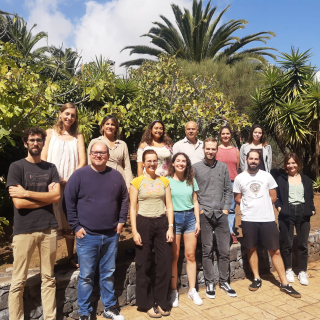van de Ven, Glenn; Falcón-Barroso, J.; Ryś, A.
Bibliographical reference
Monthly Notices of the Royal Astronomical Society, Volume 428, Issue 4, p.2980-2994
Advertised on:
2
2013
Citations
53
Refereed citations
50
Description
We present the first large-scale stellar kinematic and line-strength
maps for dwarf elliptical galaxies (nine in the Virgo cluster and three
in the field environment) obtained with the SAURON (Spectrographic Areal
Unit for Research on Optical Nebulae) integral-field unit. No two
galaxies in our sample are alike: we see that the level of rotation is
not tied to flattening (we have, e.g., round rotators and flattened
non-rotators); we observe kinematic twists in one Virgo and one field
object; we discover large-scale kinematically decoupled components in
two field galaxies; we see varying gradients in line-strength maps, from
nearly flat to strongly peaked in the centre. The great variety of
morphological, kinematic and stellar population parameters seen in our
data points to a formation scenario in which properties are shaped
stochastically. A combined effect of ram-pressure stripping and galaxy
harassment is the most probable explanation. We show the need for a
comprehensive analysis of kinematic, dynamical and stellar population
properties which will enable us to place dwarf ellipticals and processes
that govern their evolution in the wider context of galaxy formation.
Related projects

Traces of Galaxy Formation: Stellar populations, Dynamics and Morphology
We are a large, diverse, and very active research group aiming to provide a comprehensive picture for the formation of galaxies in the Universe. Rooted in detailed stellar population analysis, we are constantly exploring and developing new tools and ideas to understand how galaxies came to be what we now observe.
Ignacio
Martín Navarro